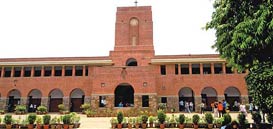St. Stephen's College, Delhi
This is a collection of articles archived for the excellence of their content. |
Contents |
2014
India's no. 2 in Arts
All ranks below indicate the college's position among India's best Arts colleges and were determined by India Today
CITY: New Delhi
Founded on February 1, 1881, St. Stephen's is the oldest college in Delhi. It was first affiliated to Calcutta University, and later to Punjab University. With the establishment of Delhi University in 1922, it became one of its three original constituent colleges.
PARAMETER-WISE RANKING
Reputation: 2
Academic Input: 2
Student Care: 2
Infrastructure: 2
Placement: 2
Perceptual Rank: 2
Factual Rank: 11
2015
India’s no. 1 in Arts
2015: Becomes a ‘Society’
The Times of India, Nov 20 2015
St Stephen's set to turn `society' leaf
The draft constitution of St Stephen's Educational Society signifies massive changes in the future running of Delhi's best-known college. The draft, which became public on Thursday , will be tabled at a special meeting of the St Stephen's College governing body on November 23. For starters, the draft pertains to a St Stephen's Educational Society instead of St Stephen's College, itself a society. This society is a new entity that will have a governing body--which is now the college's supreme council -now slightly expanded with seven members instead of six. The supreme council is composed entirely of Church of North India members.
The supreme council will oversee “institutions“, meaning “educational institutions, schools, colleges, universities, medical colleges, research and learning centres established by the society .“ This suggest plans for expansion and St Stephen's College will be one of the institutions each of which will have its own governing body .
The college's governing body, argues lawyer and alumnus Sunil Mathews, is being “left toothless.“ The draft's proposals reduce the teacher repre sentation in the GB. The present GB has four positions for teachers -two elected, two appointed by rotation. The new one, if this draft is passed, will have just two and by rotation.
“The present GB where this will be placed is improperly constituted. The teachers' election couldn't take place at all but decisions are being taken. It is important to have elected members to serve as checks,“ says Nandita Narain, maths teacher, Delhi University Teachers' Association chief.
The GB will have the power to create “new categories of posts other than purely temporary posts“, a provision Mathews sees as violation of the University Grants Commission's norms. “The council used to appoint only the principal and took some decisions on admissions. Now it has most of the powers the GB enjoyed,“ adds Mathews. This list includes powers to “lay down guidelines governing admissions of students and appointment of teaching faculty, control policy, development and direction of the institution(s), to administer the finances and control the income and expenditure of the institution(s). It will also “have the power to veto, over-rule, supersede, amend, modify , and or suspend any decision taken by the governing body .“ As per the original constitution, “The supreme council shall have control of the religious and moral instruction of students and, in addition, shall appoint the principal after proper advertisement.“
“Clearly , the supreme council was never given a role in administrative matters. Our founding fathers wanted to keep the religious aspect separate from academic and administrative matters,“ said Narain.
The principal's role will change too. “The principal shall have and exercise complete control over the discipline of the institution, the courses taught in the college as well as its day-to-day administration,“ says the draft.
However, the principal's role is being expanded in disciplinary matters, originally the GB's province. The principal will act “as immediate authority in all disciplinary matters pertaining to governing body appointees subject to ratification of such action by the governing body and as final authority in respect of all other employees,“ says the draft.The principal has also the power to decide “which staff members shall reside in the institution's staff quarters“ and also recommend for increments. “This is clearly an attempt to throw some of us out of the campus,“ says Narain.
